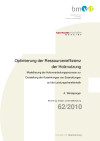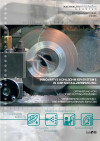Suchergebnisse für "Factsheet: Energietechnologien gestalten, die für alle sinnvoll und nutzbar sind"
EasyCell - Design optimization of PEM fuel cells for reducing auxilliaries and simplificating the material-management to facilitate the mass production
EasyCell - A common use of PEM fuel cells is not yet established. It is the aim of this project to optimize the design of PEM fuel cells (minimization of peripheral units, simplified handling of gases and the right design for mass production) to ease a widespread use of PEM fuel cells.
Optimierung der Ressourceneffizienz der Holznutzung

Modellierung der Holzverarbeitungsprozesse zur Darstellung der Auswirkungen von Entwicklungen auf die Leistungscharakteristik
Schriftenreihe
62/2010
A. Windsperger
Herausgeber: BMVIT
Deutsch, 220 Seiten
Downloads zur Publikation
Broschüre "Aktuelle Ergebnisse - Haus der Zukunft, Neubau"
Die Broschüre präsentiert eine Auswahl an richtungsweisenden Projekten im Bereich Neubau.
Innovative Kühlschmier-Systeme in der Metallzerspanung

Optimierung von High speed Cutting-prozessen, Verbesserung des Umwelt- und ArbeitnehmerInnen-Schutzes.
Forschungsforum
3/2006
Herausgeber: BMVIT
Deutsch, 6 Seiten
Downloads zur Publikation
Raising efficiency by an optimized filters purification system using waste heat in metal industry
Purification and disposal of production effluents in waste water from metal manu¬fakturing processes is of economical and ecological importance for the Joh. Pengg AG. Econamical solutions for optimised purification of the filter textiles and the drying of the filter cake with waste heat have been found.
PROMISE - Production with solar energy. Study on the potential of thermal solar energy systems in trade and industry depending on the production processes
Documentation of realized plants for the use of thermal solar energy in trade and industry companies. Identification of production processes and branches, which have a demand for low-temperature heat. Determine the potential of solarthermal systems to provide low-temperature heat. Case studies for branches and processes with the highest mid-term potential for realization of a solar plant.
Wood Plastic Composites - Neue Wertschöpfung aus Holzspänen
Systematische Untersuchung einer neuen Werkstofffamilie, welche aus Abfallstoffen der Holzindustrie, nämlich den Holzspänen, in Verbindung mit geringen Mengen an thermoplastischen Polymeren (Polyolefine, 5-40%) hergestellt werden. Sie haben holzähnlichen Charakter, können aber mit Fertigungstechnologien der Kunststoffindustrie verarbeitet werden.
Fachtagung: Forum Energieeffizienz 2014
3. April 2014
Linz AG, Wiener Straße 151Linz, AT
Im Rahmen dieser Fachtagung werden verschiedene Themen im Bereich Energie- und Energieeffizienz behandelt und diskutiert. Dabei spannt sich der Bogen von rechtlichen Aspekten des geplanten Energieeffizienzgesetzes über Themen aus der Messtechnik bis hin zu Energiemanagementsystemen, Zertifizierung nach ISO 50001 und schlussendlich praktischen Anwendungen diverser Lösungen in der Gebäudetechnik und in der industriellen Produktion.
Application of the Stirling cycle for environmentally compatible cooling - systems analysis
Conventional cooling has adverse effects on environment (eg. ozone depletion, global warming). One option for environmentally compatible cooling systems for near ambient temperatures (-10 to -50°C) is the Stirling cooler with environmental friendly process.
Instationarity as a limiting factor for the use of industrial waste heat in heating-networks
Industrial waste heat is predominantly instationary. Thus utilisation of industrial waste heat in district heating systems is constrained. A database and an evaluation methodology were developed to support increased utilisation of this heat source.
Sustainable Business Planner (SBP) Online
Die Online-Version des Sustainable Business Planners ist ein Instrument zur angeleiteten Erstellung eines "Sustainable Businessplans".
Vierte Ausschreibung "Fabrik der Zukunft"
Die Programmlinie "Fabrik der Zukunft" im Impulsprogramm "Nachhaltig Wirtschaften" lädt ProjektwerberInnen ab sofort zur Einreichung ein.
Susprise Newsletter
Das ERA-Net SUSPRISE veröffentlichte einen letzten Newsletter, der einen Überblick über die Aktivitäten in 2008 gibt.
Development and optimization of a parabolic trough solar collector for generation of process heat for industrial processes
Development and optimization of a parabolic trough solar collector for generation of process heat for industrial processes. The operating performance and optimization possibilities of a prototype were evaluated and an improved prototype was tested with respect to its efficiency characteristics as well as in a small-scale application with a realistic load profile.
Workshop: Beitrag der Abfallwirtschaft zur Versorgungssicherheit seltener Rohstoffe?
Zentraler Inhalt des Workshops ist die Frage der Bedeutung der kritischen Rohstoffe im Bereich der Abfallwirtschaft.
Raise in efficiency due to optimized waste heat management in heat intensive processes of the metal-working industry
This project drives at optimizing the energy input at the manufacturing process of oil tempered spring steel. This aim is met by investigating different options of waste heat recovery from industrial furnaces and heat insulation of heat treatment bathes. Besides, options of lead removal from anthracite will be listed.
Wood Plastic Composites - Direktextrusion
Entwicklung einer Holzspänedirektdosierung
EEP Award 2009
Auch heuer haben österreichische Unternehmen die Möglichkeit sich mit innovativen Projekten um den Europäischen Umwelttechnik Innovationspreis zu bewerben.
Personal Power Plant
The application of PEM fuel cells is limited to certain singular products. The reason for this are the relatively high prices for the components of a PEM fuel cell. It is the aim of this project to fabricate the components of a PEM fuel cell by using mass production technologies such as injection moulding. In sequence this will lead to wide-spread applications of PEM fuel cells (personal-power-plant).
Development of miniaturized, ceramic high-temperature fuel-cell-components using resources-perserving mass-production processes
The application of nano scaled powder and powder injection moulding (PIM) for energy efficient co-sintering of miniaturized solid oxid fuel cells which can produce current and heat by using renewable raw materials.
